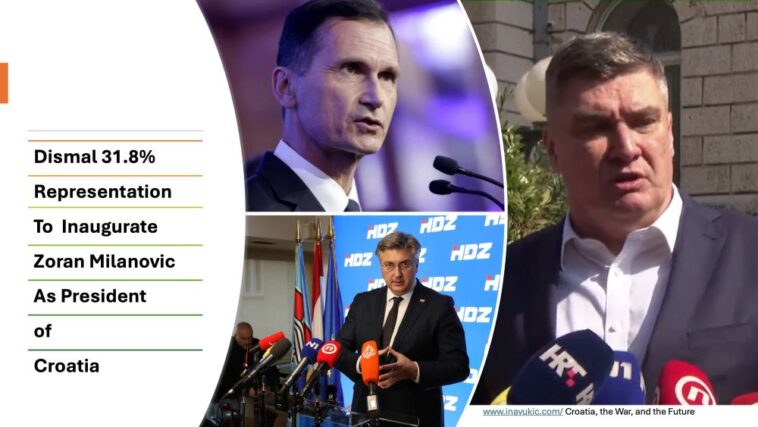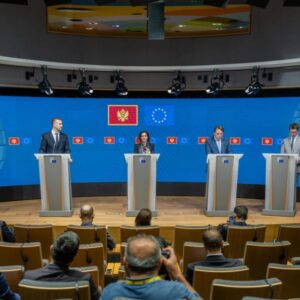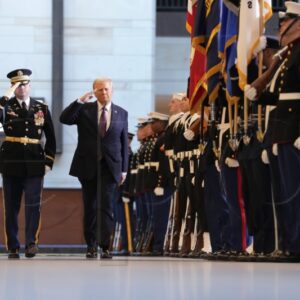The incumbent president, populist leftist and overwhelmingly pro-Russia Zoran Milanovic, was re-elected to the post by a wide margin between him and his opponent, current government party Croatian Democratic Union’s/HDZ’s candidate Dragan Primorac in the second round of voting on January 12. With the dysmal voter turnout of 44% Milanovic scooped 74.7% of the 44% percent that voted, and Dragan Primorac scooped 25.3% of that turnout.
While Milanovic’s backers, former League of Communists turned Social Democratic Party/SDP that always fought against, not for the independence of Croatia from communist Yugoslavia, stupidly boast in the Croatian parliament and the media, e.g. SDP President Sinisa Hajdas Doncic, that SDP’s candidate Zoran Milanovic scooped a 75% support from Croatian people and, therefore Andrej Plenkovic’s government is finished and SDP will take over soon, the fact is that Zoran Milanovic scooped only a pathetic 31.8% support from the Croatian people.
Milanovic’s re-election to the largely symbolic position serves as a setback for Plenkovic’s government, whose government has been often embroiled in corruption scandals implicating government ministers. Thirty government ministers have dropped off from Plenkovic’s cabinet in implicated association with corruption scandals since 2016. Certainly, the failure to step more heavily on the tail of corruption as well as his evident excessive favouritism towards the Independent Democratic Serb Party/SDSS headed by Milorad Pupovac and directly associated with Serb atrocities against Croats during the 1990’s war of Serb aggression against Croatia, appear the main culprits for the steep drop in popularity of Plenkovic’s government during the past few years. The widespread disappointment in that both Plenkovic’s government, and Zoran Milanovic’s when he was the Prime Minister, have gravely betrayed the values of the 1990’s War of Independence. Hence, a possible reason why voter turnout at elections are so low, and reflect minority choice for representation.
Milanovic is a staunch critic of Western aid for Ukraine as well as the country’s future accession into the military alliance. He previously referred to Ukraine’s 2014 Euromaidan protests as a “coup d’état” and has rallied against Western allies and Ukraine for not respecting the Minsk Agreements. In October 2024, Milanovic refused to approve the participation of Croatian soldiers in NATO’s mission to support Ukraine even when all that Andrej Plenkovic proposed was to send two men, two Croatian soldiers, to participate in Germany in the training of a group of Ukranian soldiers in specific skills. This decision by Milanovic contradicted the support package agreed upon at the July ‘24 NATO summit, which included establishing the NATO Security Assistance and Training for Ukraine (NSATU) to coordinate military aid and training for Ukraine by partners. On the other hand, the Croatian government, mainly aligned with Andrej Plenkovic, has strongly supported military aid to Kyiv, including the delivery of 14 Mi-8 helicopters, and Plenkovic himself has made several visits to Ukraine.
In contrast, Milanovic has criticised Western sanctions on Russia and opposed the provision of arms to Ukraine, highlighting a clear divide between him and the government. Milanovic ran a presidential campaign that reinforced some of his established positions, such as opposing the deployment of Croatian armed forces in the Ukraine war, his League of Communists nostalgia, while also broadening his critique on other fronts. Notably, he delivered a sharper denunciation of Primorac’s ties to Israel, asserting during a debate on public television that these connections involve mass murderers and “criminals like Itamar Ben-Gvir.”
Zoran Milanovic who was from the start, 1990, against independence of Croatia, has stated publicly in his first mandate as President of Croatia that Croatia is an accidental country, that it should not have seceded from communist Yugoslavia. He has been instrumental in condemning and rejecting from use by people the slogan “For Homeland Ready” (Za dom spremni) that units of HOS (Croatian Defence Forces), paramilitary arm of Croatian Party of Rights, wore on their sleeves.
Even with its limited roles, many Croatians see the presidency as key to providing a political balance by preventing one party from holding all the levers of power but, more importantly to be the keeper of national political ideology and direction in democracy far away from the former communist Yugoslavia. Milanovic is a dangerous politician for Croatia’s transition from communism. He has not truly shifted his opinion about Croatian independence since the day he refused to fight for it during the 1990’s genocidal Yugoslav Army and Serb aggression against Croatia and Croats.
After voting in Zagreb had closed on Sunday 12 January, Milanovic criticised Brussels as “in many ways autocratic and non-representative”, run by officials who are not elected. What a hypocrite! He calls his 31.8% win – representative! It is not! Not by a long shot.
Zoran Milanovic and his visible mindset is the living example of circumstance in power that makes transition from communism to democracy in Croatia tantamount to agony. Agony especially for the multitudes that fought and lost blood to carry Croatia out of the communist Yugoslavia regime. Also, Andrej Plenkovic’s supportive circle within the HDZ party has contributed to this agony. Not enough pro-Croatian Homeland War values and too much, as many appear to hold, of reconciliation excuses towards “killer Serbs” for that. All governments of Croatia since the death of Franjo Tudjman in December 1999. i.e., since year 2000, whether SDP-led or HDZ-led, have failed miserably to align the legislature and its compliance to purely democratic principles. Many laws still remain a mere rehashing of laws that existed in communist Yugoslavia. Checks and balances in order to formally monitor compliance with the rule of laws have persistently evaded governance in the country. Hence, keeping the power “behind the counter”, as it was in former Yugoslav regime, rather than taking it to the “front of the counter” where government services users stand.
The ugly and public long-standing antagonism between Zoran Milanovic and Andrej Plenkovic is set to continue. By all accounts Plenkovic and Primorac had not congratulated Milanovic on his election victory for the Office of the President. Whether it is a tit-for-tat situation or something deeper will eventually be revealed. It is true, however, that Milanovic was not always consistent in congratulating his opponents their electoral victories, especially Plenkovic.
According to the Croatian media, Croatian Prime Minister Andrej Plenkovic said Monday 13 January that HDZ Presidency Board had decided that neither he nor Parliament Speaker Gordan Jandrokovic would attend the inauguration of President Zoran Milanovic, which is to be held by 19n February. „We will not allow ourselves to get into a situation where we listen to Milanovic swear by the Constitution, which he then violates,” said Plenkovic and added that this is a political position. He pointed out that fewer voters than ever have turned out for the presidential elections than on Sunday 12 January, but added that they “take note of the results” and respect them.
The hostility and conflict between the Prime Minister and President of Croatia has become a familiar phenomenon which very likely has kept the vast majority of eligible voters away from the polling booths on election days. While a similar pattern of conflict can be found in other former communist regimes of Eastern Europe that is of no consolation to those who fight for full democracy and full transition from former communist regimes. How much of this voter apathy is due to the reluctance of many to take on personal responsibility towards a healthy democracy is an unknown. If one takes into consideration that 93.24% of all Croatian voters at the independence referendum in May of 1991 voted for secession from communist Yugoslavia, then it is fair to assume that the non-voters, current majority of voters, desire a third option or political force, away from HDZ and SDP, that would take them into the „promised land“ that was promised during the War of Independence. The other side of this coin could well be in personal existential reasons.
The local government elections due in May 2025 are likely to provide a better picture of how both HDZ and SDP stand with support.
Generally, one may easily pick up within the Croatian community, both at home and abroad, something similar to The Red Scare Americans felt during the era of Senator Joseph R. McCarthy in relation to perceived threat of communism. In 2025 Croatia though, these perceptions are based on the known communist oppression under Yugoslavia, which, in light of Milanovic’s disturbing pro-Josip Broz Tito of communist Yugoslavia stance, makes such perceptions an unsettling reality. Croatian governments and presidents since the year 2000 have all failed to ban communist Yugoslavia insignia, to publicly condemn and process communist crimes, to prove by their actions that Croatia is truly free from its communist Yugoslavia prison. When and if the non-voting majority will dig its heels in and say “enough is enough” may be something that the coming five years of Milanovic’s mandate will show. Ina Vukic




